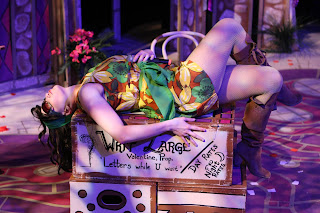 We've been getting RAVE reviews for Two Gents! “Shakespeare has never been this much fun!” (Harry Hamm, KMOX-FM); “the most purely enjoyable evening of theatre I've had in a long, long time.” (Steve Callahan, KDHX); “I honestly can't recall when I've ever witnessed an audience laugh at and enjoy Shakespeare more.” (Chris Gibson, BroadwayWorld.com). I'll post them all here when they're all in.
We've been getting RAVE reviews for Two Gents! “Shakespeare has never been this much fun!” (Harry Hamm, KMOX-FM); “the most purely enjoyable evening of theatre I've had in a long, long time.” (Steve Callahan, KDHX); “I honestly can't recall when I've ever witnessed an audience laugh at and enjoy Shakespeare more.” (Chris Gibson, BroadwayWorld.com). I'll post them all here when they're all in.But one review today begs for a response. Mark Bretz' review in The Ladue News was extremely complimentary about our production (giving us a 4.5 out of 5 rating!), but somewhat dismissive of the show itself. Mark wrote, "Like its subject material, this musical version of Two Gentlemen of Verona is flawed, most notably by a dreadful opening and closing number, 'I Love My Father,' that features amazingly banal lyrics more wincingly childish than sophisticated. Despite the clumsy introduction and stumbling finale, this winsome work by MacDermot, Guare and Shapiro is a delightful romp that is much more than the sum of its parts."
But I think he's missing a lot here...
First, the references to the changing of the seasons that open the first song (and the show) are about these young people's constantly changing moods and loves. They sing, "I am like all seasons" -- really? all of them? -- and we will soon see that their mixed-up young lives are a psychedelic kaleidoscope of constantly conflicting and shifting emotions. They really are like all seasons at once! But this opening is also a song about a shallowness (or even a complete lack) of self-awareness that will drive the entire plot. They throw around the word love a lot, but none of them really knows (yet) what love actually is. They haven't experienced real love, so their take on it is, of necessity, shallow. Notice the end of the opening song: "I love my mirror, I want to tell me, I want to love me." These are selfish, childish people. It's joyful, but it's without substance...
Mark's complaint that the opening lyrics are more childish than sophisticated is true and it's intentional. How could these selfish, childish, sheltered, young people have a sophisticated view of themselves or of life...? And what kind of story would start with the protagonists having complete self-knowledge? That has to be earned in a Hero Myth.
Hair makes the same point sometimes, giving its hippies intentionally shallow, childish things to say or sing because they are shallow and childish in a lot of ways. Berger's rant before the song "Easy to Be Hard" is as childish and selfish and hurtful as anything Proteus does in Two Gents. And I think the creators are making the point that the hippies were not all Zen Masters. Because so many of them were children, they also tended to be selfish and self-involved.
I think in some ways, Two Gents is about the selfish side of the hippie movement. Sure it was about peace and love, but it was also about getting laid and getting stoned...
And the finale, which I totally love, is about letting go of the bullshit that always surrounds love. The main characters have learned that "the shock of happiness" comes when they stop thinking about what they want and start thinking about what the person they love wants. And though the "I love my father" section was shallow and perfunctory at the beginning, here there is some more adult understanding of the interconnectedness of everyone (which is the point of the Tai Chi moves). The discovery here of real love, rather than the excitement of lust or the easy gratification of selfish infatuation, teaches them what a wrong road they've all been on. When Launce sings, "Wonderland is not where Alice is..." he's standing in for all the lovers, who now understand that true love doesn't exist in a fantasy world of hearts and flowers, and that love and joy can be found in the real world. Fake, shallow love drove them all crazy, but real, rational, adult love will drive them all sane...
I think sometimes reviewers fault a show for not being or saying what they expect. I think Mark wanted the writers to make a statement in the opening and closing numbers, but instead the characters make those statements. As in Assassins, these messed up people have to speak for themselves. And though it may not be tidy and clear, it's a lot more real that way...
Self-knowledge doesn't come easily.
Long Live the Musical!
Scott







0 comments:
Post a Comment